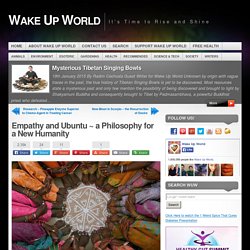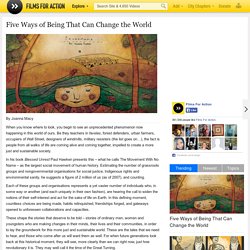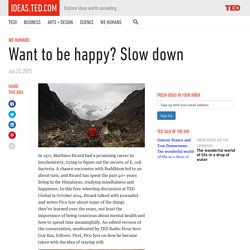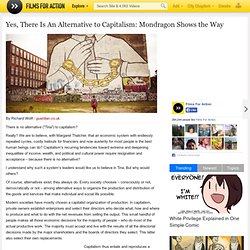

Empathy and Ubuntu ~ a Philosophy for a New Humanity. 23rd October 2014 By Jennifer Deisher Contributing Writer for Wake Up World Here we are on our beautiful blue green planet, travelling through time and space, hurtling toward infinity.

Whether we realize it or not, we are united by our humanity. As we each begin to flow into our spiritual journey, we become aware of a consciousness beyond our rational 3D comprehension. For many of us though, there is something more. The Hierarchy of Needs We can understand our most basic human needs, and also our higher spiritual needs, through the psychological tool known as Maslow’s Hierarchy of Needs [i]. Maslow’s Hierarchy of Needs So as messengers of a new paradigm, our challenge is not just to focus on the development of ‘higher’ personal aspects such as creativity, self-esteem and self-love, but to embrace and support those whose basic (and therefore spiritual) needs are not fulfilled, and help them create the sense of security and belonging they need as stepping stones to self-actualization.
Why? The More Beautiful World Our Hearts Know is Possible: A Conversation with Charles Eisenstein - Pachamama Alliance. On Wednesday, January 15th, the Pachamama Alliance hosted a live video conversation with visionary writer Charles Eisenstein.

This interactive event was insightful, moving, and provocative and covered topics ranging from what a miracle truly means, to the convergence of spirituality and activism, to the shift to a “new” emerging story. The New, Emerging Story Charles Eisenstein’s talk focused on the stories we tell ourselves about the way the world works. The old story that we are now leaving says that cause and effect is simple and one-way: you work to make something happen and if you are successful, it happens, regardless of anything else that might be happening in the world.
The new, emerging story is one of inter-being in a living universe – everything affects everything else and our very existence depends on the existence of others. Miracles: An Invitation to a Larger Reality Within this paradigm, Eisenstein explains that a miracle takes on a new significance. Hear the Full Audio. Workers of the World... Relax! Ursula Le Guin Speech Challenges The Inevitability of Capitalism. Five Ways of Being That Can Change the World. When you know where to look, you begin to see an unprecedented phenomenon now happening in this world of ours.

Be they teachers in favelas, forest defenders, urban farmers, occupiers of Wall Street, designers of windmills, military resisters (the list goes on…), the fact is people from all walks of life are coming alive and coming together, impelled to create a more just and sustainable society. In his book Blessed Unrest Paul Hawken presents this – what he calls The Movement With No Name – as the largest social movement of human history. Estimating the number of grassroots groups and nongovernmental organisations for social justice, Indigenous rights and environmental sanity, he suggests a figure of 2 million of us (as of 2007), and counting. These shape the stories that deserve to be told – stories of ordinary men, women and youngsters who are making changes in their minds, their lives and their communities, in order to lay the groundwork for this more just and sustainable world. 1. Want to be happy? SLOW DOWN. In 1972, Matthieu Ricard had a promising career in biochemistry, trying to figure out the secrets of E. coli bacteria.

A chance encounter with Buddhism led to an about turn, and Ricard has spent the past 40+ years living in the Himalayas, studying mindfulness and happiness. In this free-wheeling discussion at TED Global in October 2014, Ricard talked with journalist and writer Pico Iyer about some of the things they’ve learned over the years, not least the importance of being conscious about mental health and how to spend time meaningfully. An edited version of the conversation, moderated by TED Radio Hour host Guy Raz, follows. First, Pico Iyer on how he became taken with the idea of staying still: Pico Iyer: When I was in my twenties, I had this wonderful 25th-floor office in midtown Manhattan, in Rockefeller Center — and I had a really exhilarating life, I thought, writing on world affairs for Time magazine.
And so I left all that behind. MR: I hear that a lot. PI: Yes. Yes, There Is An Alternative to Capitalism: Mondragon Shows the Way. There is no alternative ("Tina") to capitalism?

Really? We are to believe, with Margaret Thatcher, that an economic system with endlessly repeated cycles, costly bailouts for financiers and now austerity for most people is the best human beings can do? Capitalism's recurring tendencies toward extreme and deepening inequalities of income, wealth, and political and cultural power require resignation and acceptance – because there is no alternative? I understand why such a system's leaders would like us to believe in Tina. But why would others?
Of course, alternatives exist; they always do. Modern societies have mostly chosen a capitalist organization of production. Capitalism thus entails and reproduces a highly undemocratic organization of production inside enterprises. In May 2012, I had occasion to visit the city of Arrasate-Mondragon, in the Basque region of Spain.